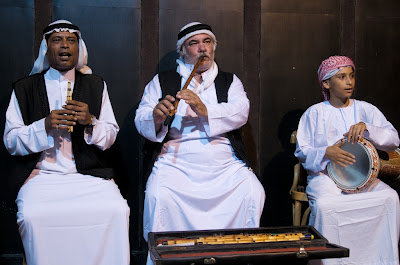Producer Banning Eyre has compiled a collection of interview excerpts from musicians, scholars and traditional music advocates in Egypt.
Beshir:
I think Egyptians are going to be more into cultural music after the revolution, because I think the revolution helped them to be more Egyptians, to be proud to be Egyptian. So the interest is going to be more into knowing their origins, including the folkloric and cultural music.
Jaafra: Sayed Rekaby
There is a type of improvisation that happens on stage. Even though certain melodies have been passed down from generation to generation, the performer is still interacting very much with the audience, in a way that harkens back to the way Arabic poetry used to be generated. It was part of common speech. It would be one poet addressing a group of other poets and then sort of volleying the poetry back and forth between them. So that happens today in this kind of music by having the performer be in tune with the audience and producing that type of interaction, feeling what they're looking for or what the performer is inspired to do in the moment, and improvising on that.

Makan (The Egyptian Center for Culture and Art)
The idea is to go forward by making a step back to a time when music was a part of the society. When I started to work in traditional music, I found that there was a big gap between how to create music, to do music, to play music, and how to present it. Usually, music is on the stage. You have a wall between audience and musicians. You have the show. So here, we went back to the moment when people come to share music together, not to consume a show. That's why here there is no stage, there is no backstage. You can talk with the musicians. You can see and touch them. You can drink tea outside. And I think it's something that we lost. But it's very precious.
Sudanese Echoes: Ahmed Sayed Abuamna, Nuba Noor, Rango
The strongest echo of old Sudanese culture in Egypt is the music and culture of Nubia. This lost African kingdom played a huge role in Pharaonic history, but its physical remnants were mostly drowned under the waters of the Nile, following construction of the Aswan High Dam in the 1960s. Nubia is the folkloric heart of Mohamed Mounir’s vast body of songs, and Mounir calls the construction of that dam and its human aftermath at “the worst project in the 20th Century and the worst migration for a heritage or a group of people.” The Nubian servant became a kind of stock figure in Egyptian films of the mid-20th century. But since the construction of the Aswan High Dam, Nubians have shared a profound sense of loss, and those who perform the music and other arts of this culture feel a huge responsibility to preserve it and pass it on.

(Nuba Noor)
Bedouin Jerry Can Band
Our ancient Bedouin found these Jerrycans in the desert after the war of 1967, our famous war with Israel. Bedouin, in his nature, he love percussion. He can play any something from the kitchen, plates, dishes. He found the jerrycan and he looked at the jerrycan. "What I can do the jerrycan?." He began to play in the front, in the middle, in the bottom. He noticed that there is a distinguished sound that comes from the bottom of this jerrycan. After that, he managed to make it the main percussion in any occasion, and in any group. For us, it’s the jerry can and the ammunition box.
El Tanbura of Port Said
We made an excursion to the Canal Zone, to Port Said, to meet Zakaria Ibrahim and hear El Tanbura and Rango perform their regular Wednesday night show at El Negma, a simple, beachside venue, across the Suez canal from Port Said, in the sister city of Port Fouad. The ride takes mere minutes. The show was a spirited affair, despite the fact that Ramadan had begun. The sound system left much to be desired, but the ambiance was terrific, with a gathering of locals singing and dancing along. El Tanbura had 12 guys on stage that night, and the intricate percussion rhythms and melodies of the simsimiyya lyre were entrancing. Various members, including Zakaria, got up to sing. It had the feeling of a social club as much as a band. After the show, we retired to Zakaria’s favorite shisha bar in Port Said, and talked and jammed until sunrise. A night to remember.

See Full Video Playlist HERE









